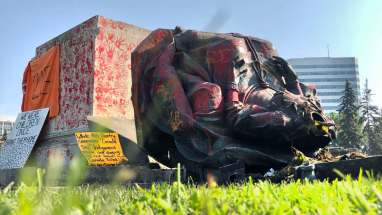Buck’s team survives brutal life blitz Bombers offensive co-ordinator's tough-as-nails wife beats breast cancer, then rallies for victory over leukemia
Read this article for free:
or
Already have an account? Log in here »
To continue reading, please subscribe:
Monthly Digital Subscription
$0 for the first 4 weeks*
- Enjoy unlimited reading on winnipegfreepress.com
- Read the E-Edition, our digital replica newspaper
- Access News Break, our award-winning app
- Play interactive puzzles
*No charge for 4 weeks then price increases to the regular rate of $19.00 plus GST every four weeks. Offer available to new and qualified returning subscribers only. Cancel any time.
Monthly Digital Subscription
$4.75/week*
- Enjoy unlimited reading on winnipegfreepress.com
- Read the E-Edition, our digital replica newspaper
- Access News Break, our award-winning app
- Play interactive puzzles
*Billed as $19 plus GST every four weeks. Cancel any time.
To continue reading, please subscribe:
Add Free Press access to your Brandon Sun subscription for only an additional
$1 for the first 4 weeks*
*Your next subscription payment will increase by $1.00 and you will be charged $16.99 plus GST for four weeks. After four weeks, your payment will increase to $23.99 plus GST every four weeks.
Read unlimited articles for free today:
or
Already have an account? Log in here »
Hey there, time traveller!
This article was published 16/07/2021 (1605 days ago), so information in it may no longer be current.
Buck Pierce thought he knew pain.
Dangerously concussed, multiple fractures, harrowing hits that left him gasping for air. It was a darkness he knew intimately as a CFL quarterback.
But in a year when not a single down was played, he’s seen a far deeper threshold for suffering, he’s witnessed profound humility and grace in the face of adversity. And what became crystal clear is the toughest person in the Pierce household is not a former footballer.
● ● ●
Although the CFL is still weeks away from returning, the Pierce family is already viewing the Winnipeg Blue Bombers 2021 season a massive success.
Pierce was promoted to Bombers offensive co-ordinator in 2020, after years as the team’s running backs and then quarterbacks coach. He will be watching the Aug. 5 season-opener, a 2019 Grey Cup rematch between the Bombers and Hamilton Tiger-Cats, from his new perch, calling plays high up in the Bombers control centre at IG Field.
The rest of the family — wife Lori and their two kids, daughter Bailey, 6, and son Bo, 3 — aren’t sure where exactly they’ll be come kickoff. With infection numbers declining and vaccinations rates increasing, the province has opened up attendance for fully vaccinated fans, so the hope is they’ll be able to take in the game live.
While it would certainly be nice to be close to dad and husband during his official debut, just being able to watch the game as a complete family is cause for celebration.
“Our kids refer to Bombers football as Daddy’s football. So, we’re excited to watch some Daddy football,” Lori says during a lengthy Zoom interview with the Free Press, with Buck also on the call from his office in the bowels of IG Field.
“And we’re excited to just do everyday things. Our summer is going to be different than it was last year, and we’re going to enjoy every minute of it.”
A lot has happened for the Pierce family over the past 365 days. Last summer, Lori was diagnosed with acute myeloid leukemia, an aggressive cancer commonly referred to as AML. The disease starts in the bone marrow (the soft, inner part of certain bones, where new blood cells are made), and moves to the blood, where the cancer can quickly spread elsewhere in the body.
The diagnosis struck like a bolt of lightning, an unexpected and demoralizing turn of events that would upend future plans and drastically change their lives. Long days on the football field were replaced with long stays at the hospital, as COVID-19 cancelled the 2020 CFL season and put restrictions on who could visit Lori, and when.
Over the last year, there have been dark times and small victories. It would take some incredible luck, a few changes in lifestyle and, ultimately, a stem cell transplant from her brother, but the family has pulled through. Lori has been in remission since November, free of the disease that for months threatened her life.
Now, they want to share their story, hoping that doing so will help others who have gone or are going through a similar reality.
“I want people to know that they’re not alone, that they’re really not alone,” Lori says. “That I know what that feeling is like when you get bad news. Your heart literally drops, the temperature of your blood changes. We know that feeling, unfortunately, but we do.”
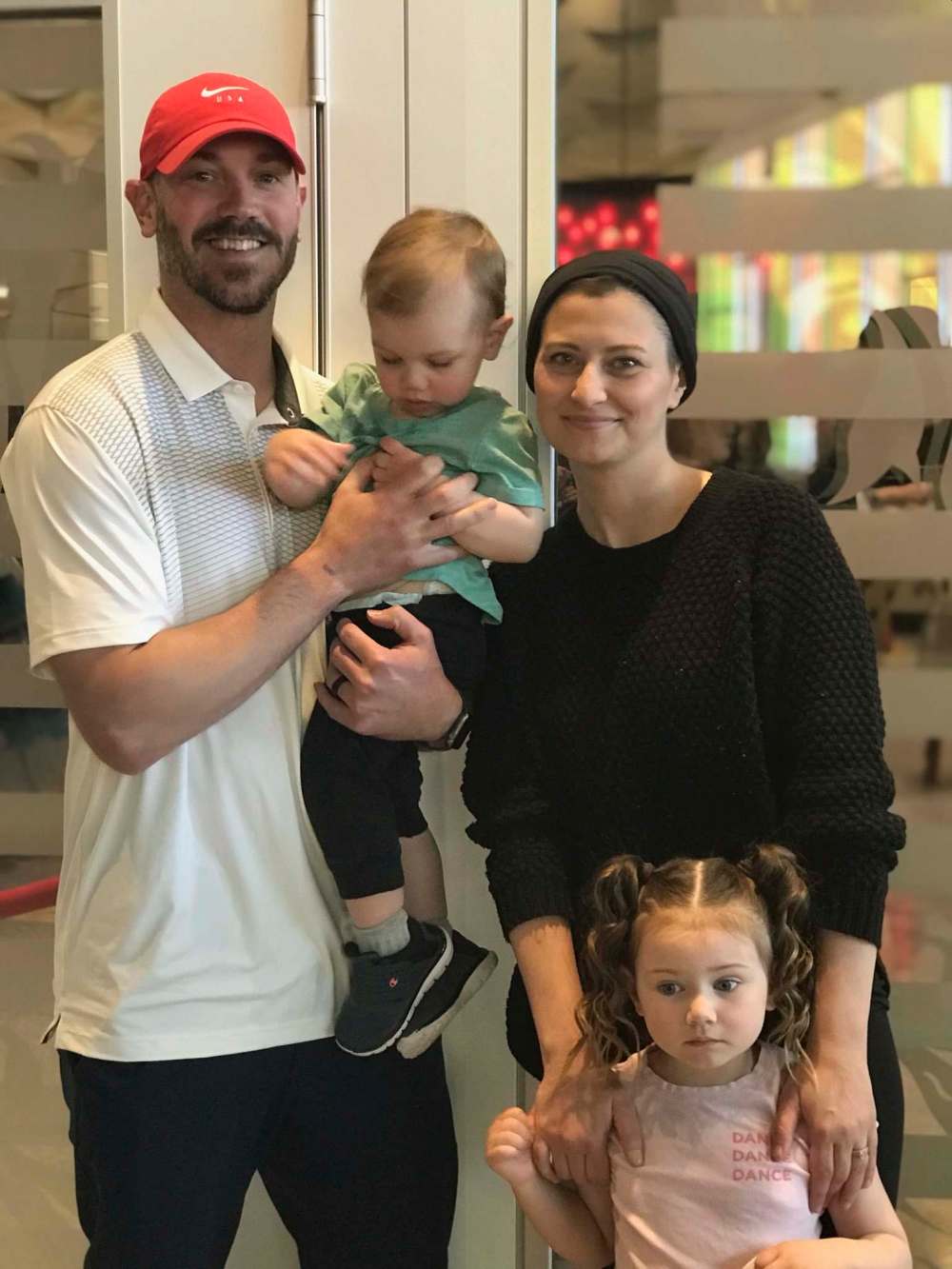
Buck adds: “You learn how to manage difficult situations; you learn how to be appreciative of other things you have. You learn you’re stronger than you think, and attitude is half the battle.”
● ● ●
When the 2020 CFL season was put on hold, it created the perfect opportunity for the Pierce family to take a rare summer holiday out of town. With COVID-19 still limiting extensive travel, they decided to rent a cabin at Victoria Beach, planning to spend a full week of July in the sun and water.
Days into the getaway, Lori started to feel heavy waves of fatigue, requiring her to rest more often than usual. Her strength was starting to wane, too.
“I woke up in the middle of the night and Lori was getting our two-year-old a bottle at the time and she was lying on the floor, so she didn’t have much energy to get up,” Buck says.
“At that point right there, something kind of clicked and I said, ‘Hey, we probably need to go home, we need to go to the doctor and figure out what’s going on.’ So, we packed up, we went home that day, she got blood work and the blood work came back not good.”
While the blood work wasn’t promising, it also wasn’t definitive. The options varied, from a common flu to more serious diagnoses, including cancer. It was serious enough for the doctors to want to keep Lori overnight so she could undergo further tests.
The hospitals were hectic and because of COVID-19, visitors were limited. It was 48 hours into her stay that she was officially diagnosed with acute myeloid leukemia.
“Just disbelief,” Lori says when asked to describe the moment. “‘How did this happen? Are you sure?’ I just shut down.”
The verdict was enough to take their breath away, but how Lori contracted AML left the family speechless. You see, this was Lori’s second bout with cancer. She knew the unpredictable road ahead of her.
Lori was diagnosed with breast cancer in September 2018, after she had noticed a swollen lymph node under her armpit the month before. She remembers not feeling right; meanwhile, her family and friends, in an attempt to put her mind at ease, reminded her she was young and fit, still in her 30s, that women go through this all the time and that it was most likely going to be nothing.
“They just, they try to reassure you. But I just had a gut feeling that something was wrong,” Lori says. “And then when it was confirmed, it was just earth-shattering. I had two small babies at home. I was still on maternity leave from my job from when Bo was born. Earth-shattering is the only word.”
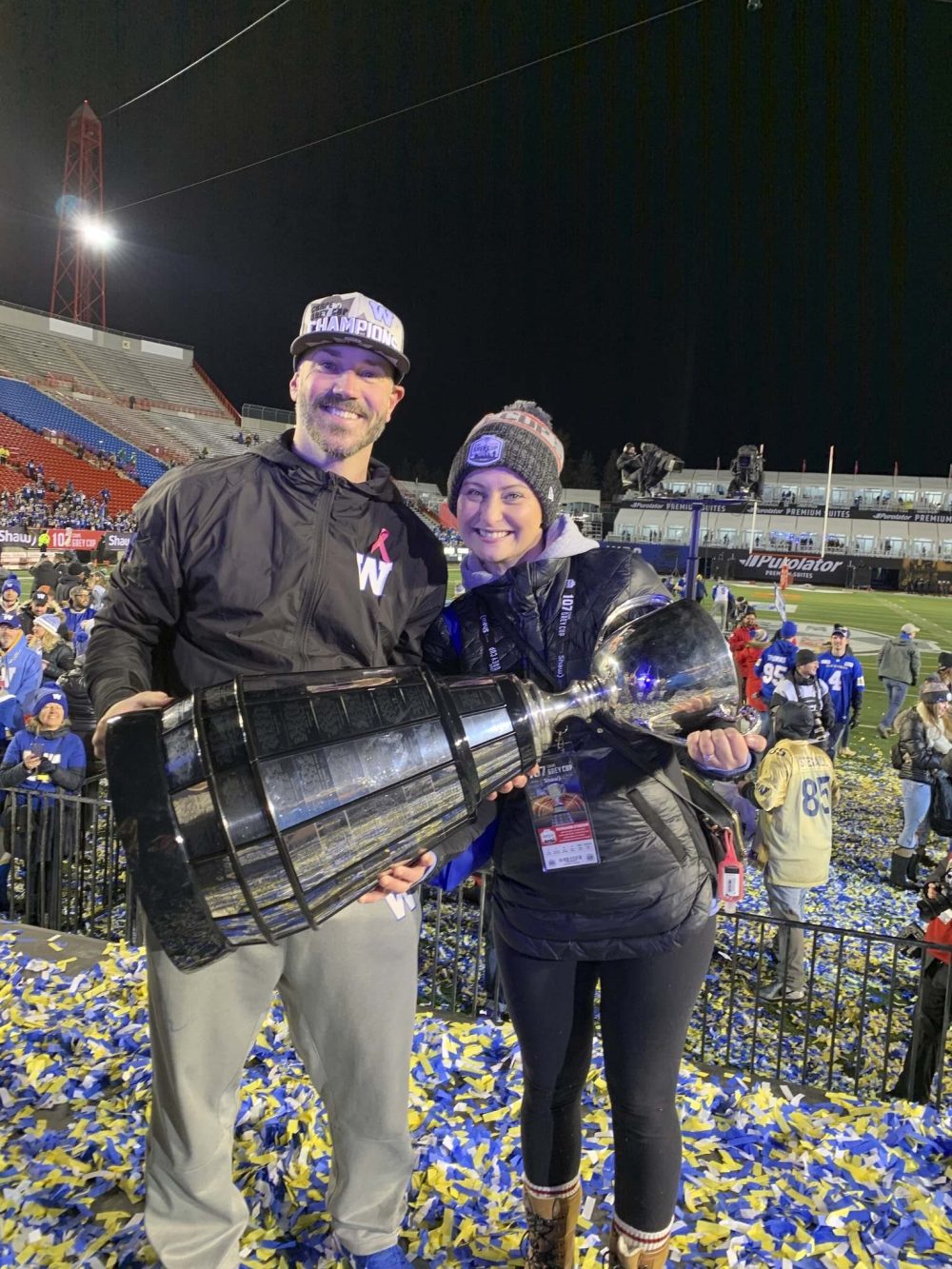
At that point, Lori and Buck knew nothing about breast cancer, nor did they know anyone close to them who had gone through it and could provide advice. That didn’t matter as they would soon learn each person reacts differently.
Some of the panic eased after they met with an oncologist and surgeon and were provided a plan. Lori would go through eight bouts of chemotherapy, spread out every two weeks, at Grace Hospital, followed by a double mastectomy, with breast reconstructive surgery after that.
“It was a pretty intense surgery. It took about 10 hours because they did it all in one go,” Lori says. “And then, about a month after that, I started radiation therapy.”
By early 2019, the radiation had eradicated all the cancer in Lori’s body and the Pierce family was starting to return to a sense of normalcy. They were in their new house, hosting friends, and the football season couldn’t have gone better. The Bombers snapped a 28-year Grey Cup drought with a 33-12 win over the Ticats. Lori and the family all flew to Calgary to watch the game and join in the victory celebrations.
To receive news months later that she would have to prepare for another fight of her life seemed unimaginable. The fact that it was the breast cancer and, specifically, the ensuing chemotherapy or radiation that caused the AML, made the impossible now feel real.
“From what I read, it was a 0.5 per cent chance that one of the side effects, due to either the chemotherapy or the radiation (from the breast cancer), was leukemia. Which they go over with you when you start the journey, but you’re told it’s a very low chance,” Lori says.
“And they told me, ‘OK, we’re going to do a couple days of extremely intense chemotherapy.’ To be honest, I kind of thought at the time that would be it. I thought I’d do chemotherapy, lose my hair again and I’d be done. And then one of the specialists came in and started talking about a bone marrow transplant. The first question they asked was, do I have any siblings?”
●●●
As a young and only child at about the age of seven, Jason Guarino can recall badgering his parents for a little brother or sister. He would end up getting both.
First came a brother, Chris, followed by Lori, who is 10 years younger than Jason. They were a tight-knit family growing up in Charleswood, with all three kids active in sports.
“As a kid she was super-outgoing, super active. She was into all sorts of different kinds of dancing, and as she entered high school, she was very much into cheerleading at Oak Park, later coaching the team after she graduated,” Jason says. “She’s a very creative person, too, who kept busy and had tons of friends.”
Jason says it’s almost a year to the day that he received a call from Lori asking if he’d be willing to get tested to see if he was a potential match as a stem cell donor. He recalls the year before that phone call, the family was celebrating Lori’s July 1 birthday, which doubled as a celebration for winning her battle with breast cancer.
The mood was positive; Lori was feeling rejuvenated. They were excited about the upcoming family trip to Victoria beach.
Like most big brothers, Jason and Chris jumped at the chance to help their sister. Lori doesn’t recall ever asking if they would donate, but she also didn’t have to.
“I would do anything to help my little sister,” Jason says. “The whole thing came out of left field for me; at that point I could only imagine what she was going through.”
The odds of a sibling being a match, Lori says, was about 50 per cent, with a 100 per cent match coming in around 25 per cent.
When the results came back a week later, Chris was a 50 per cent match, which was positive news, as related donors at that rate are often accepted. But then Jason came back as a 100 per cent match, making the decision an obvious one.
Before the transplant, there was another hurdle to clear. Because of how weak Lori’s body would be during the transplant — she would receive three days of extremely intense chemotherapy in order to “bring her to her absolute lowest” just prior to the procedure — doctors needed to make sure Jason was healthy enough to donate.
He couldn’t be a big drinker or smoker, which he wasn’t, and they hoped he was fit and exercised regularly, which he is and does. The only other challenge for him was to stay healthy before the transplant.
This is something that would have just been a footnote in the story if not for Jason contracting COVID-19 at his workplace. Luckily, it happened a month after he had already completed the procedure. While it was certainly an eye-opening experience, he suffered little in the form of side-effects and has fully recovered.
Jason was not only the perfect match, but he was also the perfect donor. The doctors and nurses were amazed by how many stem cells he was producing.
“The machine estimated that I produced nine or 10 million stem cells and what they typically look for is like three or four million to do a successful transplant,” he says.
“Because I basically had double what they were hoping for, they froze what they didn’t use and that will be saved for Lori for a future day, if she ever, heaven forbid, needed it.”
Within three hours of getting the stem cells from Jason, doctors were starting to transfer them into Lori, who was a couple of floors above her brother, in the GD6 ward at Health Sciences Centre. While the perfect match was certainly promising, there was no guarantee her body would react well enough to adopt the new stem cells.
She felt chills and had a fever the first night after the transplant. After all, her body was trying to fight off a foreign substance, while at the same time doctors were hoping the cells were settling into their new home.
Dozens more blood tests followed, each one revealing just a tiny bit of progress, at least enough to feel encouraged. Lori says they set up a family group text, where they would routinely share her white blood-cell count.
“It would go up 0.1 of a percentage, and it was firework texts, and it was like that for weeks,” she says. “I was in hospital for another three weeks and you still don’t know how your body’s reacting. But I was at least able to go home after that and recover from there.”
She developed a severe rash on her back and, for a time, her taste buds seemed off. That was all viewed as good news, since the reaction meant her body was responding well.
A month after the transplant, following a biopsy in November 2020, she was officially in remission. She still goes in for routine blood work every couple of weeks to make sure she remains in the clear, but has started to live a mostly normal life again.
“For me, remission means today,” she says. “For anybody, you never know what the future brings. I wasn’t able to do a lot of things I loved for a long time, the things you kind of take for granted.”
●●●
Buck and Lori Pierce were married May 17, 2014, under a bright prairie sun, surrounded by their closest family and friends.
Buck wore a three-piece suit, a black watch with a leather band and a single white rose pinned near his heart. Lori was dressed in a fitted white wedding gown, with a skirt that tapered just above the knee, long enough to form a small wake behind her. Her long, gorgeous brown hair was curled and in a side ponytail, the jewels on her neck and wrist glistening as she held a matching bouquet of white roses in her hands.
In his vows, Buck marvelled at how lucky he was to have found his perfect teammate. He promised to always love Lori and be right there next to her, should she ever struggle. Lori echoed much of the same, promising always to believe in Buck.
It was almost four years to the day that they first met. Buck had just signed with the Bombers ahead of the 2010 CFL season, after five years with the B.C. Lions. He had already developed into a respected leader and competitor on the field and had the reputation of being a good person off it.
Not really knowing many people in the city, his new teammate Doug Brown figured it would be a good idea to invite him over for a barbecue. That way, he could introduce himself to some of the other players who’d be there and enjoy an evening in what was now his new football home.
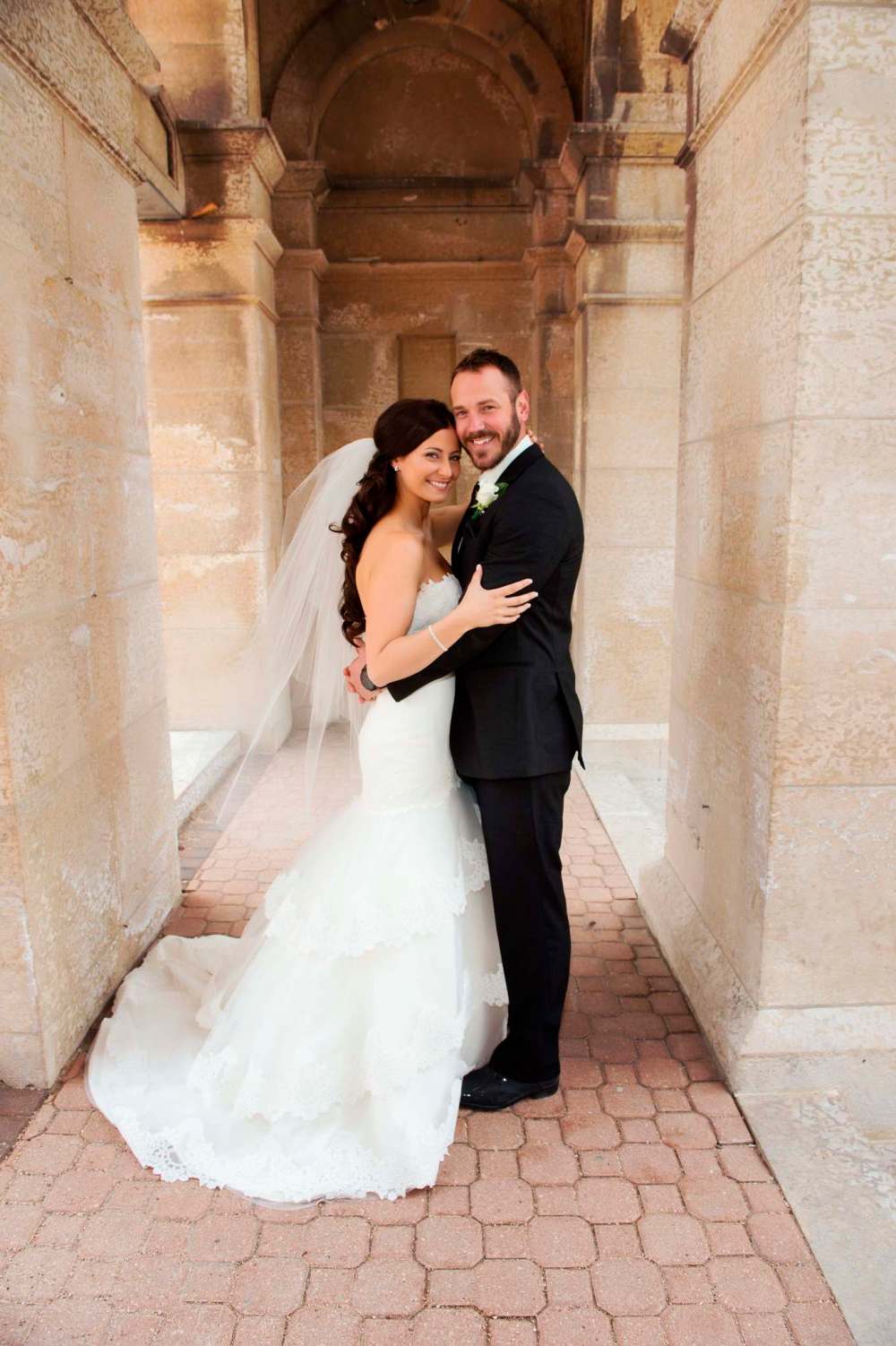
It wasn’t long before Buck and Lori struck up a conversation. Both animal lovers, they began bonding over Brown’s dog, Sam, a Weimaraner puppy with endless energy.
“My very first impression of him was that I loved his voice. I just loved the tone of his voice,” Lori says. “We spent more time talking to the dog than other people.”
For Buck, Lori was easy to talk to, someone he could be himself around. A vulnerability not always afforded to a professional athlete.
“I always thought she was a very, very strong and independent woman, someone who spoke her mind,” he says. “She was just being herself.”
That marked the start of what would evolve into a strong foundation of love and support, one that would be leaned on heavily as Lori underwent multiple battles with cancer.
If Buck thought Lori was strong then, what he would witness as she endured long stays at the hospital, intense and painful bouts of chemotherapy, while also being a mother of two young children, would take it to an undefinable level.
“The word ‘tough’ doesn’t even do her justice,” Buck says, before finding words more commonly used to describe football players. “It was her grit and determination to do things that I think a lot of people who aren’t in that situation don’t understand. I think that story needs to be told, of what she went through, and others like her.”
While much of the Pierces’ journey through breast cancer, and then AML can be summed up by each small victory along the way, life was incredibly difficult at times.
When Lori was diagnosed with breast cancer, she says the only thing she could think about was her family. How would they handle this? What if she couldn’t tend to Bo, who was only nine months old and Bailey, who wasn’t yet four? How was Buck going to deal with this? The mind can play some serious games.
They decided as a family not to overcomplicate things with the children. Bailey has a heart of gold, acting like a second mother to her brother. Bo has a unique ability to test nerves, but at the same time pull heartstrings. Lori calls him a real sweetheart. They didn’t want to change that.
They know mommy is sick and that she goes to the doctor to get better. When she decided to take fate into her own hands by shaving her head before chemotherapy could do the job, they called it “Mommy’s really funny haircut.”
“I just wanted their lives to stay as normal as possible,” Lori says. “Our daughter started kindergarten while I was in between hospital stays.”
Twice Lori was admitted to the hospital for periods of one month. During that time, she was unable to see her kids. That also made it impossible to hide her illness from the public, something she at first worked hard to do.
Even though she says her hair was the last thing on her mind, Lori admits she felt the magnitude of the moment when she did it. She grieved in her own way, knowing it would be impossible to hide. She was known for her long — obnoxious, she says — brown locks.
“I just didn’t want people saying, ‘Oh, have you heard about Lori?’” she says. “I didn’t want people to feel sorry for me. I didn’t want people to see me and start crying. I wanted to be strong.”
●●●
To hear Doug Brown explain the kind of teammate Buck Pierce is, you would think he bled Gatorade and had permanent eye black under his steely blues.
“He always had that gunslinger vibe to him, that ‘Brett Favre’ mentality in the sense that he just played with reckless abandon and an unfailing belief in his receivers,” says Brown, a Canadian Football Hall of Famer who played two seasons with Pierce in Winnipeg before retiring in 2011.
“We used to ask him to please stop diving head-first to make plays. But he was just always willing to lay it all on the line. That’s just who he is.”
Born in Kansas, raised in California and educated at New Mexico State, where he majored in kinesiology, Buck grew up embedded in the game. On his first run from scrimmage as a college player, he took off for 75 yards. In Lori’s vows, she promised to always cheer for the University of Kansas Jayhawks.
While he started his career in Vancouver, it’s in Winnipeg where Buck found a real home. He invested in the community almost immediately. If there was a charity that needed a face from the Bombers, Buck was there. If they needed to sell tickets to a game and felt an autograph session would achieve just that, it was, “go grab Buck.” He became a part-owner in a barbecue restaurant near the old stadium.
On one occasion, he was at a wedding social in Steinbach and someone asked a Blue Bombers staffer if Buck might be willing to meet his family afterwards. After all, the father, a massive Bombers fan, was back home and loved Pierce’s style of play. Buck didn’t only say yes, he spent hours with the entire family as the limo ran outside in the cold.
He cared about others’ success just as much as his own, and resisted lashing out at the media, making him a fan favourite in Winnipeg and the perfect candidate to move on to coaching after he retired as a Lion at the end of the 2013 season. In a surprise turn of events that few know about, Pierce was offered a job by the Saskatchewan Roughriders, but as soon as the Bombers found out he was being courted, they rushed and hired him to be the team’s running backs coach.
His players love him like a brother. They admire him as a man.
“I don’t know anyone who has a bad thing to say about Buck Pierce,” Brown says. “He’s always present, always about the common good.”
It was that attitude Buck naturally adopted when joining Lori’s battles against cancer. Frequently injured throughout his career, Pierce also knew something about ignoring the odds, especially if they were weighted against him.
He dislocated his elbow partway through his first season in Winnipeg, requiring surgery. Few thought he would ever play again and when he and Bombers longtime athletic therapist Al Couture looked for professional athletes who had bounced back from a similar fate, they came up empty.
He returned the following season healed and healthy, leading the Bombers to the 2011 Grey Cup, where they ultimately fell to B.C. 34-23.
“Some people, when they’re faced with difficult things in their life, never push past those things and find out what they’re really capable of doing. In my football life, what people have thought is, ‘Man, how does he take that kind of punishment and come back?’” he says.
“I find that I’m driven to push myself past those obstacles and not accept what the norm is. So, when I’m told something isn’t achievable, I always try and push past that. That’s just kind of been my mindset my entire life.”
When it came to helping Lori, Buck admits he had to, at times, step away from being the loving husband, something he refers to as detaching himself from the situation. That’s because they had a plan and weren’t going to allow emotion to get in the way of their ultimate goal of beating the disease.
Since Lori had to alter her life, Buck did, too. They stayed committed to being positive. Buck started to focus on his own health, including changing to a plant-based diet. He hit the gym regularly and focused on his mental health.
Anything to become the rock he knew his family needed. To match Lori’s level of determination.
“I definitely took some time, whether it was by myself, away from the kids and family, to allow myself to come to grips with the reality and the severity of the situation. But I never let myself spend too much time thinking about that,” he says.
“As hard and as unrealistic as that is to hear, I never let my mind get to a point to where I was worrying about the what-ifs, the percentages, the numbers, the whole journey. I stay focused on what’s important at the moment, what’s important that day, what my wife needs from me, what my in-laws need from me, and what my kids need.”
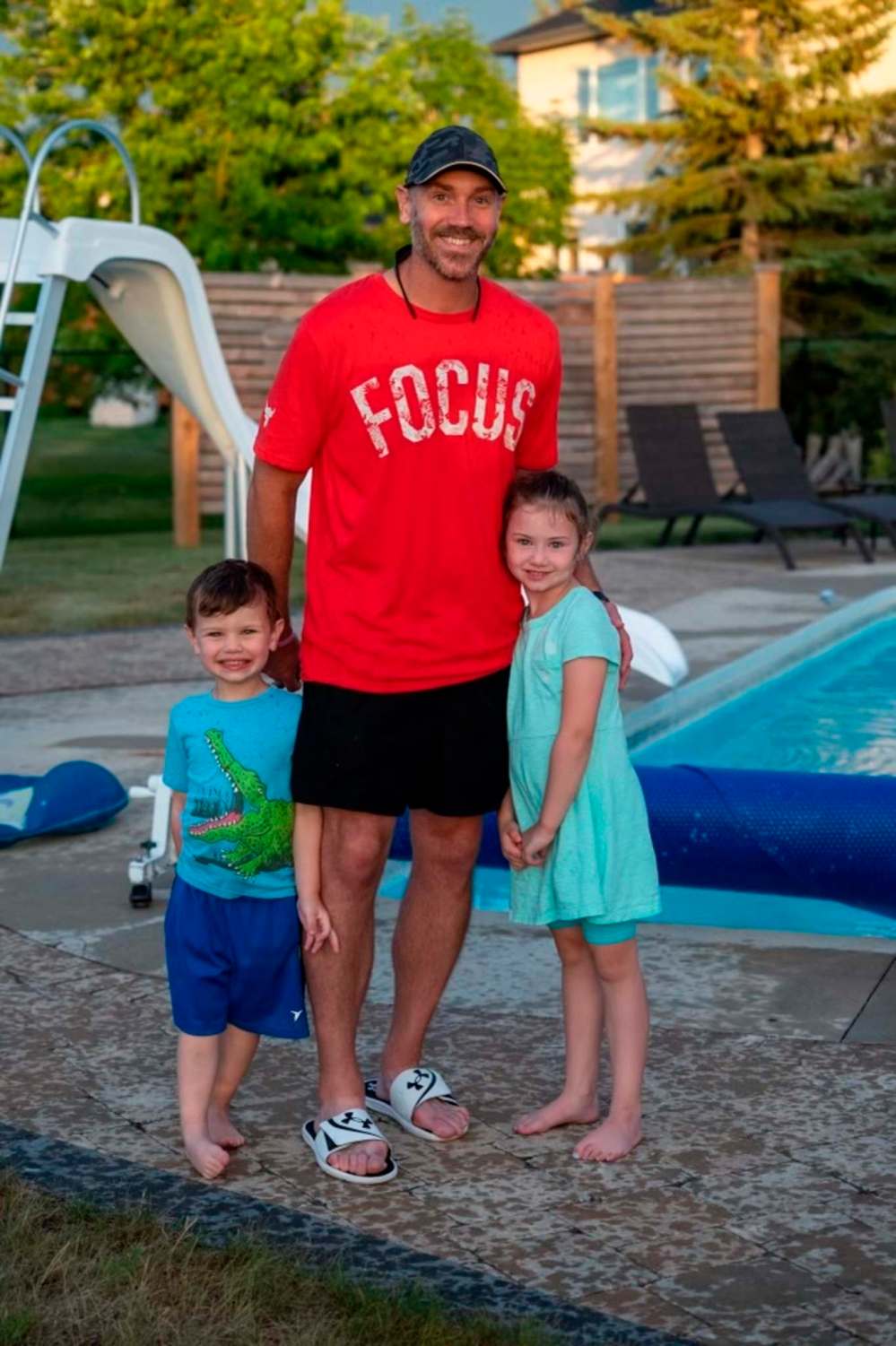
Buck would take the kids to the park, where he would be joined by Couture, the Bombers athletic therapist who lives nearby, and his daughter. The company was therapeutic, a chance to chat about something other than next steps. Other times, Buck would steal a moment alone, after the kids were bathed and put to sleep, where he could deal with things on a more personal level.
“To say it was always easy, to say I didn’t have my moments where I broke down, is absolutely false. Because I did,” he says. “I allowed myself to decompress in a positive way, understanding, for me, the best way to deal with that was getting myself mentally and physically better.”
For Lori, the darkest days were during her fight with leukemia.
“What I found was when your mind goes to those dark places — and it does go there — for me, I just can’t let myself stay there,” she says. “If you feel it, you got to switch it off and just not let yourself go back there.”
●●●
After what’s been a roller-coaster few years, the Pierce family has enjoyed a quieter pace to life these past few months.
While Lori is still feeling tired by the end of each day, she’s gaining more energy over time. They go on family walks and bike rides. Spontaneous dance parties are also known to take over the house on occasion.
“It’s all about enjoying these good days. Enjoy being able to take your kid to kindergarten, enjoy being outside with them, going swimming with them, having energy to run after them,” she says.
“I enjoy putting my kids to bed and having them jump up and down, because I have the energy to put them back to bed. Those are the things you take for granted.”
Buck’s life has already started to ramp up, as he continues to put in long days during Bombers training camp. He looks forward to calling his first play on offence.
“And continuing to progress as a family and enjoying more milestones raising our kids,” he adds.
They’re also left with an overwhelming sense of gratitude. They complain less and love more openly. Deadlines don’t carry the same kind of stress. Family time is the No. 1 priority.
Cancer has changed the way they view themselves and those closest to them, with a great appreciation for everyone who helped along the way.
That includes their “Bombers family” — everyone from the players and coaching and support staff, as well as their respective families. Lori credits her family at WestJet for also supporting her in her recovery.
Their own extended families and closest friends, of course, all of whom have been there from the beginning, whether they live in Winnipeg or provided support from a distance because they couldn’t travel during the pandemic.
They appreciate what the teachers have done at Bailey’s school, knowing exactly when she needed an extra hug. That was never lost on them.
Finally, the doctors — notably Dr. Patricia Harris from Grace Hospital and Dr. Chantalle Menard from Health Sciences Centre — and all the nurses and orderlies, and anyone else that helped make Lori’s stay as comfortable as possible.
“It’s about looking at things differently,” Buck says. “That’s a very common theme from when people go through these things in their life. You become stronger for it. You do get some clarity when you go through these things about what’s really important in life.”
jeff.hamilton@freepress.mb.ca
twitter: @jeffkhamilton

Jeff Hamilton
Multimedia producer
After a slew of injuries playing hockey that included breaks to the wrist, arm, and collar bone; a tear of the medial collateral ligament in both knees; as well as a collapsed lung, Jeff figured it was a good idea to take his interest in sports off the ice and in to the classroom.
Our newsroom depends on a growing audience of readers to power our journalism. If you are not a paid reader, please consider becoming a subscriber.
Our newsroom depends on its audience of readers to power our journalism. Thank you for your support.


